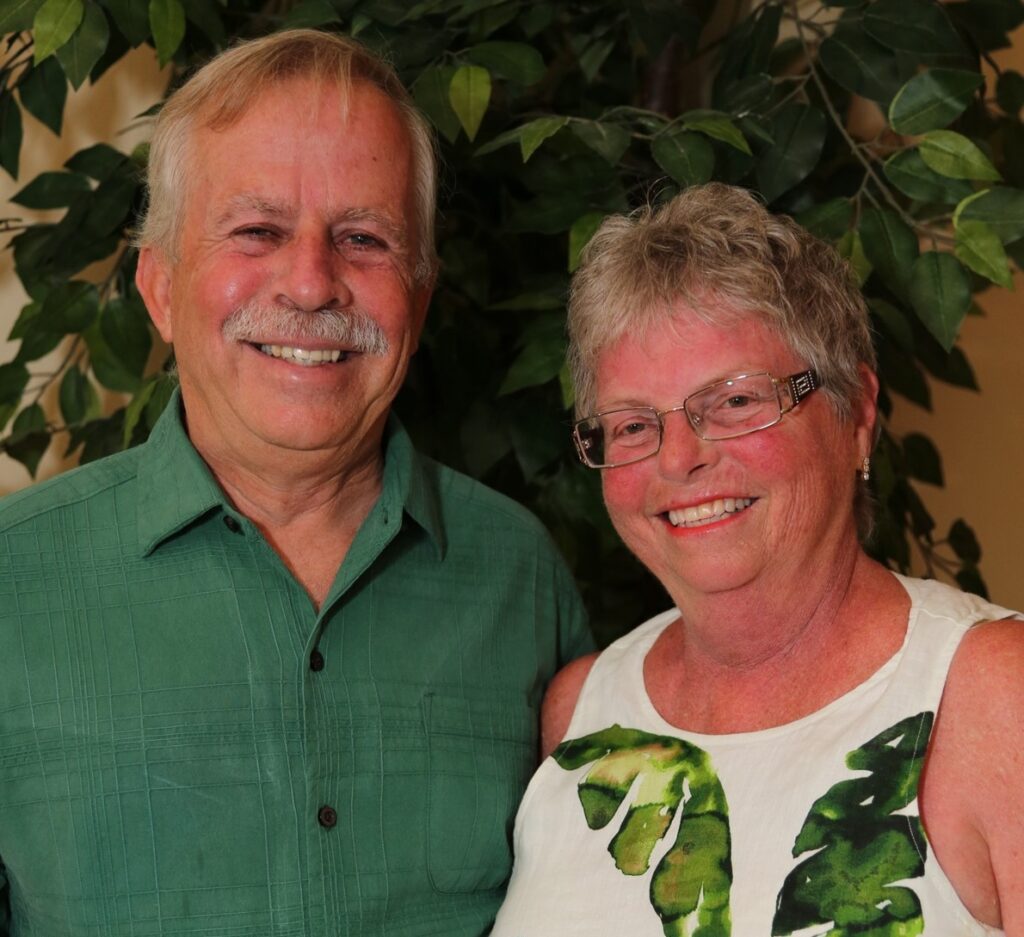Help SMAA provide support for older Mainers like Jim and Kathy.
On a warm October afternoon, Jim reflects on life with his wife, Kathy, who is a member at Southern Maine Agency on Aging’s (SMAA) Adult Day Program.
“We met in high school, way back in 1963, and though we went to college separately, we remained friends until we both ended up moving back to Saco. That’s when we became more than friends. We got married in 1974, so we’ve been married 50 years, now.”
After graduating college, Jim went into banking, and Kathy became a school teacher. She taught first and second grade for over thirty-five years. Together, they raised two children – a son and a daughter – and today they have a grandson who is almost fourteen.
“After she retired, she used to babysit him when he was a toddler. In the car, their favorite song – We Are Young, by Fun – would come on, and he’d say, ‘Are you ready, Gigi?’ and then the two of them would sing together. The other day she and I were in the car, and the song came on. I looked at her and I said, ‘Are you ready, Gigi?’ and she smiled and laughed and we sang the song together. But that’s the kind of stuff that hurts about this whole thing. I know it’s just gonna get worse. I know she won’t always remember.”
Several years ago, Kathy and Jim began noticing small changes in her memory and behavior. Eventually, in 2022, her primary care physician recommended that she see a gerontologist. There, she was diagnosed with dementia. Like many family members of people with dementia, Jim has become his wife’s full-time caregiver. As he watches his wife’s mental and physical health deteriorate, he is doing all he can to help slow the decline.
“When it’s just the two of us at home, it’s hard to motivate her to do anything with me. I want to keep her mind active, but she’ll just want to doze off. There are times when I feel like I’m not doing enough for her. And I’m losing my best friend. Sometimes with the communication, there is a spark and it’s normal. But more often there is a connection that’s missing. The depth and breadth is becoming narrower and thinner.”
Both well-loved in their community, Jim and Kathy have developed many friendships over the years. Two couples they are close to have been on a similar path to Jim and Kathy’s and have found some relief at SMAA’s Adult Day Program. They recommended the program to Jim. SMAA’s Adult Day Programs – located at the Sam L. Cohen Center in Biddeford and in Springvale at the Anderson Learning Center – are geared toward older adults with Alzheimer’s and other dementias. Staff and volunteers foster close personal relationships with and between members, and coordinate person-centered activities that engage every member in ways that are physically and cognitively stimulating (and fun!). All of this stimulates the brain, effectively slowing down the memory loss process while combating depression and isolation.
“Kathy was always, and still is, a very social person,” says Jim. “She loves people, and as a school teacher, she always loved coordinating the kind of activities she’s now participating in at the program. I feel good knowing that she’s in a safe environment and that she’s being stimulated. It’s working perfectly for her.
SMAA also offers classes and support groups through our Family Caregiver program, which has provided respite and a sense of community to many spouses and children of people living with dementia in southern Maine. Jim has found support with his friends whose spouses are in the Adult Day Program with Kathy.
“If you’re not in that situation, you just don’t get it, you can’t,” he says. “Of course, there are big things that come with this disease, but it’s the little, tiny, day-to-day things that you would never know, or never think about if you weren’t going through it. Those are the things I can talk about with them.”
Kathy is one of many members enjoying her days at SMAA’s Adult Day Program. And while their loved ones enjoy a home away from home at the Adult Day Program, caregivers like Jim receive several hours of much-needed respite.
“It’s not one little thing, it’s a whole accumulation of all those things that can amount to very long days,” Jim shares. “The program breaks up the week for us and gives me hours at a time that I don’t have to worry. And I know that’s healthy for me, just like the stimulation and social setting is healthy for her.”
